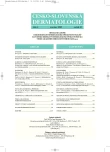Tinea capitis
Authors:
M. Skořepová
Authors‘ workplace:
Dermatovenerologická klinika 1. LF UK a VFN Praha
přednosta prof. MUDr. Jiří Štork, CSc.
Published in:
Čes-slov Derm, 83, 2008, No. 6, p. 293-297
Category:
Reviews (Continuing Medical Education)
Overview
Tinea capitis represented the most important dermatomycological diagnosis in Europe during the 19th century and the first quarter of the 20th century. Because of serious social problems the rigorous anti-epidemic measures were introduced in advanced countries that together with discovery of griseofulvin in the 1960 contributed towards almost complete disappearance of this disease in Central Europe. Since the eighties of the 20tth century the incidence of tinea capitis has been rising. In America and some parts of Europe it becomes a health problem again. Zoophilic dermatophyte Microsporum canis is the main causative agent in the Czech Republic and neighbouring countries. Antropophilic dermatophyte Trichophyton tonsurans is the most common causative agent in the USA. Trichophyton rubrum, as newly emerging pathogen, can also be detected. Due to different biological behaviour of particular etiological agents the diverse therapeutic and preventive hygienic measures must be taken.
Key words:
tinea capitis – diagnosis – therapy
Sources
1. Abdel-Rahman, SM., HERČIN, J., Fallon-Friedlander, S., Hauffe, S., Horowitz, A., Riviere, GJ. Pharmacokinetics of terbinafine in young children treated for tinea capitis. Pediatr Infect Dis J. 2005; 24(10): 886-891.
2. Bargman, H. Trichophyton rubrum tinea capitis in an 85-year-old woman. J Cutan Med Surg. 2000; 4(3): 153-154.
3. Buckley, DA., Fuller, LC., Higgins, EM., du RIVIER, AW. Lesson of the week. Tinea capitis in adults. BMJ. 2000; 320(7246): 1389-1390.
4. Cerbukovas, O., SCHWARZ, RA., Janniger, CK. Tinea capitis: current concepts. J Dermatol. 2000; 27(3): 144-148.
5. Devliotou-Panagiotidou, D., Koussidou-Eremondi, TH. Efficacy and tolerability of 8 weeks’ treatment with terbinafine in children with tinea capitis caused by Microsporum canis: a comparison of three doses. J Eur Acad Dermatol Venereol. 2004; 18(2): 155-159.
6. Fleece, D., Gaughan, JP., Aronoff, SC. Griseofulvin versus terbinafine in the treatment of tinea capitis: a meta-analysis of randomized, clinical trials. Pediatrics 2004; 114(5): 1312-1315.
7. Ghilardi, A., Massai, L., Gallo, A., Paccagnin,i E., Romano, C. Tinea capitis due to Trichophyton soudanense mimicking bacterial folliculitis. Mycoses. 2007; 50(2): 150-152.
8. Ginter-Hanselmayer, G., Smolle, J., GUSTA, A. Itraconazole in the treatment of tinea capitis caused by Microsporum canis: experience in a large cohort. Pediatr Dermatol. 2004; 21(4): 499-502.
9. GUSTA, AK., Adamiak, A., Cooper, EA. The efficacy and safety of terbinafine in children. J Eur Acad Dermatol Venereol. 2003; 17(6): 627-640.
10. GUSTA, AK., Cooper, EA., WINTER, G. Efficacy and safety of itraconazole use in children. Dermatol Clin. 2003; 21(3): 521-535.
11. GUSTA, AK., Cooper, EA., Montero-Gei, F. The use of fluconazole to treat superficial fungal infections in children. Dermatol Clin. 2003; 21(3): 537-542.
12. Hallgren, J., Petrini, B., Wahlgren, CF. Increasing tinea capitis prevalence in Stockholm reflects immigration. Med Mycol. 2004; 42(6): 505-509.
13. Higgins, EM., Fuller, LC., Smith, CH. Guidelines for the management of tinea capitis. Br J Dermatol. 2000; 143 : 53-58.
14. Chmel, L. Choroby vyvolané hubami – mykózy. In: Chmel, L., Horáček, J., Šťáva, Z. Dermatovenerológia. Osveta, Martin, 1981, s. 139-140.
15. Koumantaki, E., Georgalla, S., Rallis, E., Papadavid, E. Microsporum canis tinea capitis in an 8-month-old infant successfully treated with 2 weekly pulses of oral itraconazole. Pediatr Dermatol. 2001; 18(1): 60-62.
16. Koumantaki, E., Kakourou, T., Rallis, E., Riga, P., Georgalla, S. Doubled dose of oral terbinafine is required for Microsporum canis tinea capitis. Pediatr Dermatol. 2001; 18(4): 339-342.
17. Lipozencic, J., Skerlev, M., Orofino-Costa, R., Zaitz, VC., Horvath, A. et al. A randomized, double-blind, parallel-group, duration-finding study of oral terbinafine and open-label, high-dose griseofulvin in children with tinea capitis due to Microsporum species. Br J Dermatol.; 2002(5): 816-823.
18. Martin, ES., Elewski, BE. Tinea capitis in adult women masquerading as bacterial pyoderma. J Am Acad Dermatol. 2003; 49(2 Suppl Case Reports): S177-S179.
19. Mercantini, R., Morotto, D., Palmara, P., Mercantini, P., Marsella, R. Epidemiology of dermatophytoses observed in Rome, Italy between 1985 and 1993. Mycoses. 1995; 38(6): 415-419.
20. Mohrenschlager, M., Seidlm HP., Ringm J., Abeckm D. Pediatric tinea capitis: recognition and management. Am J Clin Dermatol. 2005; 6(4): 203-213.
21. Mohrenschlager, M., Schnopp, C., Fesq, H., Strom, K., Beham, A. et al. Optimizing the therapeutic approach in tinea capitis of childhood with itraconazole. Br J Dermatol. 2000; 143(5): 1011-1015.
22. Pomeranz, AJ., Sabnis, SS. Tinea capitis: epidemiology, diagnosis and management strategies. Paediatr Drugs. 2002; 4(12): 779-783.
23. Roberts, BJ., Friedlander, SF. Tinea capitis: a treatment update. Pediatr Ann. 2005; 34(3): 191-200.
24. Seebacher, C., Blaschke-Hellmessen, R. Mykosen. Epidemiologie – Diagnostik – Therapie. Gustav Fischer Verlag Jena, 1990, s. 62-63.
25. Schauder, S. Itraconazole in the treatment of tinea capitis in children. Case reports with long-term follow-up evaluation. Review of the literature. Mycoses. 2002; 45(1-2): 1-9.
26. Sterling, JB., Sina, B., Gaspari, A., Deng, A. Acne keloidalis: a novel presentation for tinea capitis. J Am Acad Dermatol. 2007; 56(4): 699-701.
27. Thoma-Greber, E., Zenker, S., Rocken, M., Wolff, H., Korting, HC. Surgical treatment of tinea capitis in childhood. Mycoses. 2003; 46(8): 351-354.
Labels
Dermatology & STDs Paediatric dermatology & STDsArticle was published in
Czech-Slovak Dermatology

2008 Issue 6
Most read in this issue
- Atypical Mycobacteriosis and Pitfalls of its Therapy
- Tinea capitis
- Mycobacteriosis in Fish and Risk of Human Infection
- Transepidermal Water Loss Measurement (TEWL)
